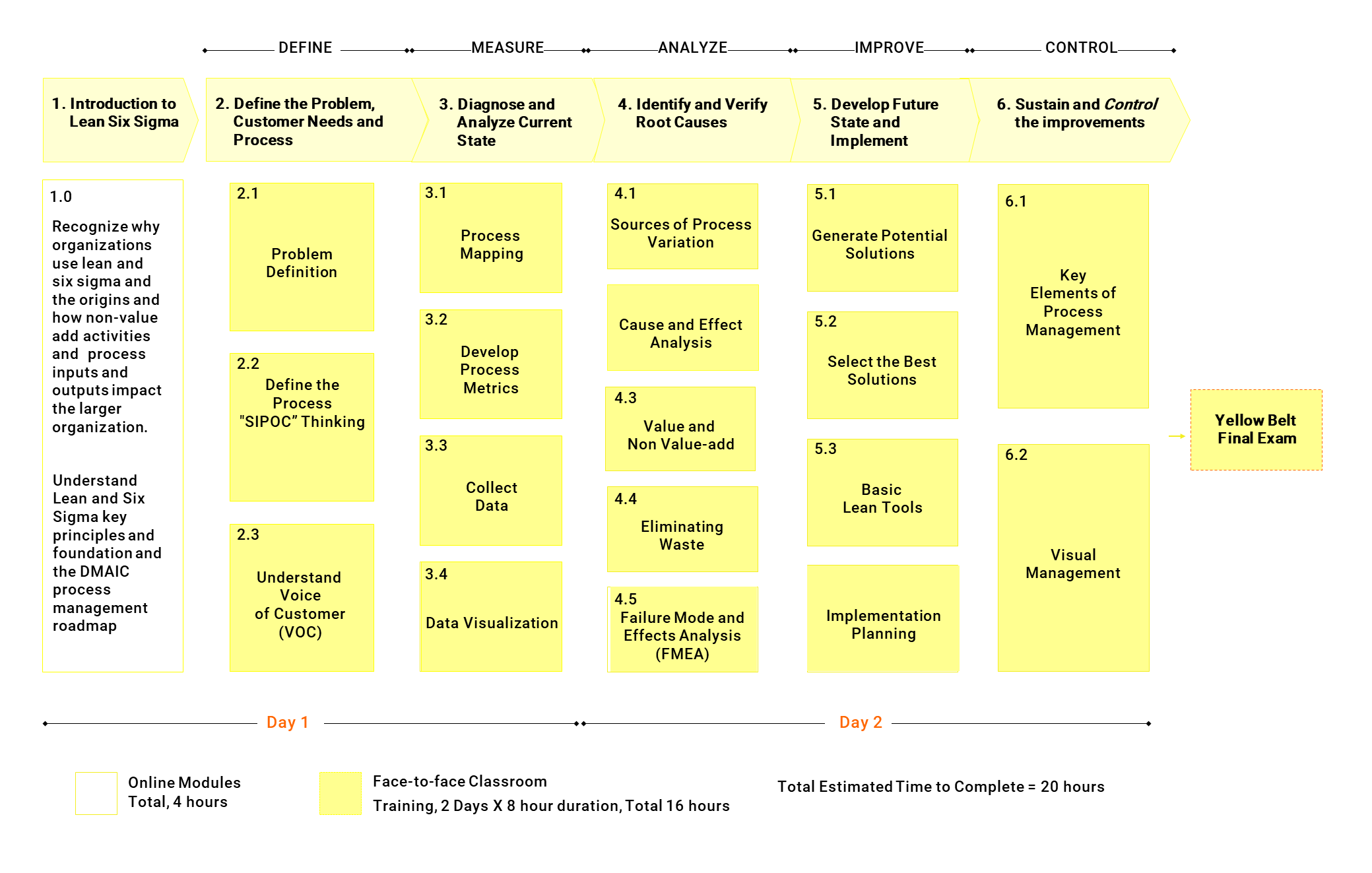Lean Six Sigma Yellow Belt Training and Certification is the “Survival-kit” teaching anyone the nuts and bolts of fundamental Lean and Six Sigma concepts and the Define-Measure-Analyze-Improve-Control (DMAIC) process improvement methodology.
The learning outcomes cover principles that apply to everyone in an organization requiring a clear, practical understanding of continuous improvement best practices as a sound basis for identifying and correcting problems. It also provides skills for mapping processes and collecting data, important groundwork for continuous improvement projects to be effective.
The training is highly interactive and includes many exercises and simulations that demonstrate how waste and variation occurs in a process and more importantly, how to use Lean and Six Sigma tools to eliminate to learn to see processes, value and waste, make data-based decisions, set clear goals and targets and break down organizational barriers and silos to drive greater operational efficiency.
How you benefit
- Acquire the mindset and knowledge of basic Lean Six Sigma tools and techniques to be able to create the foundation for continuous improvement
- Learn how to solve problems in any setting by understanding the fundamentals of process variation and waste and its affect on organizational performance
- Equips you with a methodology, Define-Measure-Analyze-Improve-Control (DMAIC) roadmap to identify and correct problems
- Discover how to measure and put continuous improvement thinking into actions
- Apply new skills for collecting and analyzing data and a toolkit to deliver continuous improvement results
Participant Profile
Yellow Belt Training and Certification is designed for professionals from a wide range of industries and business dynamics (manufacturing, service or transactional) involved in business improvement, either as part of their everyday job role or as a project team member:
- Seeking to learn new problem solving approaches and skills to initiate and implement change
- Who want to create the foundation to strengthen their organization’s continuous improvement capability
While individual participants are welcome, participation is encouraged from several individuals within the same organisation, who are current or potential members of a change implementation team.
Course Pre-requisites
Interest in developing basic continuous improvement skills
Exam and Certification
Online Exam: 20 questions
Duration: 30 min.
Pass mark: 70%
Achieve 70% pass mark in the Yellow Belt multiple choice final exam
Participants commit to a series of 8 hour days of intense face-to-face Accelerated learning. The training is practical, precise with no corners cut. Don’t expect an easy ride, you are there to learn and learn you will. We offer action-oriented, interactive courses, packed with examples, case studies and compelling best practices as part of the learning experience. Each course is designed to give participants the level of knowledge, skills and attitude to make a real difference at their workplace.
Our typical training class includes a mix of international participants from a wide variety of industries who bring their experiences to the classroom for in-depth and stimulating learning sessions with fellow participants and instructor’s, so you will take a collaborative approach to the subject matter.
Many of today’s leading organizations and educational institutions are benefiting from the power of Accelerated Learning. Game Change has pioneered and delivered this teaching and learning method for Lean Six Sigma face-to-face training. What makes Accelerated Learning so effective is that it’s based on the way we all naturally learn.
People learn best in context. Facts and skills learned in isolation are hard to absorb and quick to evaporate. The best learning comes from doing the work itself in a continual process of “real-world” immersion, feedback, reflection, evaluation and re-immersion.
Gain insight from world-class Master Black Belt Instructor’s and points of view from people who have faced the real world scenarios in managing the change resistance and barriers to implementation. Expert’s who practice what they preach and believe in their ability to demonstrate the “How” as well as the “What” to do, including compelling best practices and benchmarking opportunities as part of the learning experience.
Case studies and group tutorials conducted during the classroom sessions are designed to ensure you gain a practical understanding of systematically selecting and applying appropriate methods and tools.
The learning outcomes are individually assessed through the final exam on the on the last day of the course.
Curriculum and Course Format
1.0 INTRODUCTION TO YELLOW BELT LEAN SIX SIGMA TRAINING
Recognize why organizations use lean and six sigma, how they apply its philosophy and goals, and the origins and how non-value add activities and process inputs and outputs impact the larger organization.
Understand the relationship between lean and six sigma.
1.01 YB Course Introduction
1.02 Lean Six Sigma Overview
1.03 Introduction to Lean
1.04 The Origin of Lean
1.05 Foundations of Lean
1.06 What is Lean Quality?
1.07 Summary – Introduction to Lean
1.08 Six Sigma DMAIC Overview
1.09 Process Variation
1.10 Key Principles and Foundation
1.11 DMAIC Improvement Roadmap
1.12 Belt Structure for Skills Development
1.13 Summary – Six Sigma DMAIC Overview
1.14 Integration of Lean and Six Sigma to drive On- Time, On-Quality and On Cost performance
2.0 DEFINE
3 hours
Define the problem, the process and the customer needs.
2.1 Problem Definition
2.2 Define the Process – SIPOC Thinking
2.3 Understand Voice of Customer (VOC)
2.4 Summary – Define Phase
3.0 MEASURE
4 hours
Map the process and measure and baseline the current process performance.
3.1 Process Mapping
3.2 Develop Process Metrics
3.3 Collect Data
3.4 Data Visualization
3.5 Summary – Measure Phase
4.0 ANALYZE
4 hours
Identify the root causes of problems and waste within the process.
4.1 Sources of Process Variation
4.2 Cause and Effect Analysis
4.3 Value and Non-value Add Analysis
4.4 Eliminating Waste
4.5 Failure Mode and Effects Analysis (FMEA)
4.6 Summary – Analyze Phase
5.0 IMPROVE
Identify, select, implement and verify solutions to address root causes.
5.1 Generate Potential Solutions
5.2 Select the Best Solutions
5.3 Basic Lean Tools
5.4 Implementation Planning
5.5 Summary – Improve Phase
6.0 CONTROL
2.5 hours
Sustain the gains, establish visual management and a continuous improvement culture.
6.1 Key Elements of Process Management
6.2 Visual Management
6.3 Summary – Control Phase
Learning Outcomes Reviewed
Quizzes Segmented and embedded during and at the end of each DMAIC Phase
3 hours
Final Exam Lean Six Sigma Green Belt Certification
Total Estimated Time to Complete Yellow Belt E-Learning Modules
24 hours
Next Course Dates
E-Learning Modules
4 Hours
Face-to-Face Classroom Training 2 Day x 8Hours
16 Hours
United Kingdom
-
3rd – 4th Apr 2025
-
4th – 5th Jun 2025
Norway
Get in touch for next course dates
Classroom training sessions take place in-person between 09:00 to 17:00 BST / 08.00 to 16:00 UTC
Estimated time to complete
20 Hours
Course Fee
£ 695
What's Included
- 2 days classroom training
- Lunch and refreshments for course duration
- Printed course notes
- 12 month access to eLearning Yellow Belt course
- 12 month free access to Yellow Belt Bootcamp Learning Platform, Toolkit, Case Studies and Downloadable Resources
- Yellow Belt Online Exam and Electronic Certificate
- Unlimited Practice Exams and Re-sits free of charge
- Email Tutor support via discussion groups
Click here for more quotes like these.
Ongoing personal and professional development. Recognition and career advancement opportunities.
Part of a strong international network. Join a community of continuous improvement professionals that will support you during and long after the course is over
The quickest, easiest and most engaging way to get individuals and companies on track with Lean Six Sigma concepts and tools.
In-person and virtual workshops
Ready-to-use job aids, tools and templates
Peer-to-peer learning forums
Distinctive digital learning content
Expert coaching support
Nudges, reminders and micro learning
Excellent for remote teams
Auto-translate curriculum and instruction
Multi-channel; eLearning, virtual, face-to-face or in-house
Make progress in less time and deliver results quickly
Tailored learning solutions for companies
Mobile friendly
Highly practical
Join our Lean Six Sigma community
Practice exams
World Class Lean Six Sigma Certification




